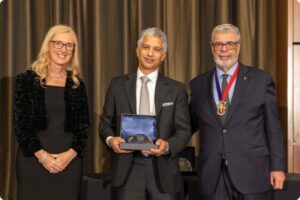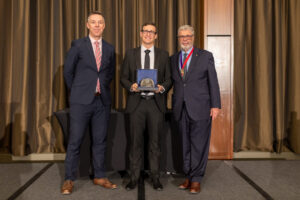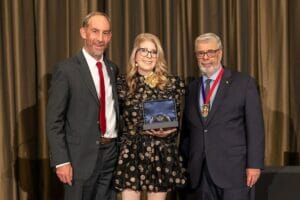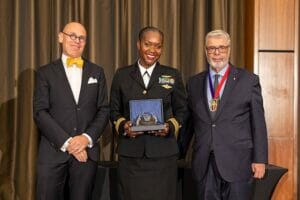Past ICRE award winners
Past Recipients of the Program Director of the Year Award

2022: Pramod Puligandla, MD, MSc; Michael Froeschl, MD, MSc, FRCPC
2021: Azim S. Gangji MD, MSc, FRCPC; Jonathan Gaudet, MD, MSc, FRCPC
2020: Marcy Mintz, MD, FRCPC, MHPE; Anupma Wadhwa, MD, MEd, FRCPC
2019: Adelle Roberta Atkinson, MD, FRCPC
2018: Bradley Petrisor, MSc, MD, FRCSC; Hilary Writer, MD, FRCPC
2017: Donna Steele, MD, MA, FRCSC
2016: Moyez B. Ladhani MD, MSc, FRCPC
2015: Mark Frank Levine, MBBCh, FRCPC; Fraser Douglas Rubens, MD, MSc, FACS, FRCSC
2014: Robert Anderson, MD, FRCPC; and Brian Chung, MD, FRCPC
2013: Ian Preyra, MD, FRCPC; and Guy Brisseau, MD, MEd, FRCSC
2012: John Manoukian, MD, FRCSC; and Karen Finlay, MD, FRCPC
2011: Thomas Maniatis, MD, CM, MSc (Bioethics), FACP, FRCPC; and Joel Fox, MD, FRCPC
2010: Heather McDonald-Blumer, MD, FRCPC; and Parveen Wasi, MD, FRCPC
2009: Ravi Sidhu, MD, FRCSC; and Terry Sosnowski, MD, FRCPC
Past Recipients of the Kristin Sivertz Resident Leadership Award
 2022: Shane Arsenault, MD, MPH; David D’Arienzo, MD
2022: Shane Arsenault, MD, MPH; David D’Arienzo, MD
2021: Nada Gawad, MD, MAEd, FRCSC; Malika Ladha, MD, FRCPC
2020: Justin Hall, MD, MSc, MPH, MBA; Richelle Schindler, MD, MSc, University of Calgary
2019: Seyara Shwetz, MD; Colm McCarthy, MD, MDCM, MSc Health Science Education
2018: Jena Hall, MD, MEd; Kimberly Williams, MD, MSc
2017: Mark E. Lipson, MD, FRCSC; Victoria E. Cook, MD, FRCPC
2016: Marie Claire Bourque, MD, MSc, FRCPC; Natasha Snelgrove, MD, FRCPC
2015: Chelsea Maedler-Kron, MD; Hassan Mir, MD
2014: Brent Thoma, MD, MA; and Lacey Pitre, MD
2013: Julie Kromm, MD; and Arun Jagdeo, MD
2012: Farhan Asrar, MD; and Sathish Rajasekaran, MD
2011: Zain Kassam, MD; and Mélissa Langevin, MD, FRCPC
2010: Jonathan Spicer, MD; and Christian Kraeker, MD, FRCPC
2009: Fiona Kouyoumdjian, MD; and Andrei Metelitsa, MD, FRCPC
Past Recipients of the International Medical Educator of the Year Award

2022: Holly Caretta-Weyer, MD, MHPE
2021: Daniel J. Schumacher, MD, PhD, MEd
2020: Felix Ankel, MD, FACEP
2019: Melchor Sánchez Mendiola, MD, MHPE, PhD
2018: Maria Trinidad Hoyl, MD
2017: Eric Warm, MD; Michelle Lin, MD
2016: Jamiu Busari, MD, PhD, MHPE
2015: Neela Al Lamki, MD, FRCPC, FACR, FRCPI, FRCP(Glasg)
2014: Abdulaziz Boker, MBBS
Past Recipients of the International Resident Leadership Award
 2022: Lieutenant Commander Ayeetin Azah, MD, MBA
2022: Lieutenant Commander Ayeetin Azah, MD, MBA
2021: Arjan Hura, MD
2020: Allison M.B. Webb, MD, MAT
2019: Simon Fleming, MBBS, MRCS, MSc, MAcadMEd, MASE(RACS), MFSTEd, FRSA, AFHEA
2018: Debraj Mukherjee, MD, MPH; Charle Viljoen, MBChB, MMed, FCP(SA)
2017: Manit Arora, MD
2016: Jordan D. Bohnen, MD, MBA
2015: Deepa Shah, MD
2014: Xaviour Walker, MD
Past Recipients of the Program Administrator Award for Innovation and Excellence
2022: Deborah Hall
2021: Jan Taylor
2020: Rachel Glennie
2019: Elisabeth Almeida
2018: Micheline MacDonald
2017: Sara Cover
2016: Candice Stroud
2015: Ginette Snook, CMEA
2014: Meegan Dowe
Past Recipients of the ICRE Top Research Paper Award
2022: Differential attainment at the Intercollegiate Membership of the Royal College of Surgeons (MRCS) examination: A high-stakes postgraduate surgical examination. Mr. Ricky Ellis, University of Aberdeen, Scotland
2021: The most crushing thing: Understanding Assessment Burden for Residents in CBME. Dr. Mary Ott, Western University, London ON
2020: Discordance Between Competency-Based Assessment Using a Global Versus Reductionist Approach for Medical Students. Dr. Holly Caretta-Weyer, Stanford University School of Medicine, California
2019: The effects of gender on multiple mini-interview station scores for Selection into Australian Orthopaedic Surgery. Ian Incoll, MD, Australian Orthopaedic Association, Sydney
2018: A grounded theory study of assessment anchors in postgraduate medical education: Forthcoming opportunities and ongoing tensions. Nancy Dudek, MD, University of Ottawa, Ottawa
2017: Early detection of residents at risk of failure using a keyword specific algorithm. Mr. Gaby Tremblay, Université Laval
2016: Feedback credibility in a formative postgraduate OSCE: Effects of examiner type. Lynfa Stroud, MD, University of Toronto, Toronto
2015: Entrustment in practice, a competency based curriculum assessed.Karsten van Loon, Sint Lucas Andreas Hospital, Amsterdam
2014: Factors that influence residents’ perceived credibility of examiners during a formative OSCE. Lynfa Stroud, MD, University of Toronto, Toronto
2013: The impact of varying levels of implementation fidelity on resident perceptions of an assessment innovation. Shelley Ross, University of Alberta, Calgary
2012: Weighing the Influences: Advice Seeking During Residency Training. Katherine McKinney Lexington VA Medical Center
2011: Remediation of residents in difficulty: A retrospective 10 – year review of the experience of a postgraduate board of examiners. Ingrid Zbieranowski, MD, University of Toronto, Toronto
2010: Evaluation of a structured wellness curriculum for emergency residents. Kathryn Dong, MD, University of Alberta, Edmonton
2009: Towards a profile-based method for evaluating residents: Faculty ranking and clustering of text-based profiles. Jodi McIlroy, MD, University of British Columbia, Vancouver
2008: Analysis of Difficult Chest Tube Insertion Procedure – Revealing Limitations in Prototype Bench Model Training. Karen Joughin, MD, University of Queensland, Brisbane
Top Resident Quality Improvement Paper
2020: Weighed and found wanting: An assessment of inpatient electronic sign-out list quality. Dr. Peter Farag, University of Toronto, Toronto
2019: Providing evidence-based care, day and night: A quality improvement initiative to improve intensive care unit patient sleep quality. Stuart Douglas, MD, Queen’s University, Kingston
2018: Resident practice-sharing in an academic family medicine teaching unit: Exploring effects on patient care and the resident educational experience. Stephenson Strobel, MD, Department of Policy Analysis and Management
2017: Reducing repetitive ‘routine’ blood testing among hospitalized patients. Laura Walker, MD, St. Michael’s Hospital, Toronto
Past Recipients of the ICRE Top Resident Paper Award
2022: Resident and attending physician perspectives on direct and indirect observation. Dr. Kathleen O’Connell, University of Ottawa, Ottawa, ON
2021: “Reduced to my race once again”: Perceptions about underrepresented minority students admitted to medical school in North America. Dr. Hailey Barootes, Western University, London ON
2020: Divergent Experiences: An analysis of Gender Differences in Feedback during EPAs Internal Medicine. Dr. Maxime Billick, University of Toronto, Toronto
2019: Assessing impact of research training on performance in general surgery residency. Alexandre Mikhail, MD, University of Toronto, Toronto
2018: Does the operative experience of UK general surgery trainees reflect the entrustment model of competency assessment? Elizabeth Elsey, MD, University of Nottingham, Nottingham
2017: Evaluation of a resident lead teaching program for the MRCPCH clinical examination Wales UK. Dr. Smiti Bihari, Morriston Hospital, Swansea
2016: Resident evaluations of faculty: Resident versus faculty perspectives. Roochi Arora, MD, McMaster University, Hamilton
2015: Thinking on the front line: Understanding resident decision making in clinical practice. Emilie H. Stevens, MD, University of British Columbia, British Columbia
2014: The effects of resident duty hour reform on evolving concepts of professionalism: A qualitative study. Ning-Zi Sun, MD, McGill University, Montréal
2013: To Stay Or Not To Stay: A Grounded Theory Study Of The Post-Call Behaviours And Rationalizations Of Postgraduate Medical Trainees. Taryn S. Taylor, Western University, London
Past Recipients of the ICRE Top What Works? Award
2022: Scaling and spreading Quality Improvement education in the face of scarcity: Doing more with less. Dr. Alan Gob, Western University, London, ON
2021: Creating and Sustaining the Pivot to Virtual Primary Care: Implementation and Evaluation of the Virtual Care Competency Training Roadmap (ViCCTR) in a large postgraduate residency program. Dr. Batya Grundland, University of Toronto, Toronto ON
2020: Gauging reflective practices in pediatric residency candidates through an MMI station. Dr. Spencer van Mil, McMaster University, Hamilton
2019: Providing evidence-based care, day and night: A quality improvement initiative to improve intensive care unit patient sleep quality. Stuart Douglas, MD, Queen’s University, Kingston
2018: From resident-as-teacher to resident-as-role model: Enhancing resident teaching skills curricula. Robert Sternszus, MD, McGill University, Montréal
2017: An innovative vehicle for delivering the ‘social pediatric’ curriculum. Dr. Tara Baron, Northern Ontario School of Medicine
2016: Emergency Medicine with Follow-Up: A Situated Learning Model for Teaching Inpatient Medicine to Emergency Medicine Residents. Chris Merritt, MD, Brown University, Providence, Rhode Island
2015: An integrated approach to teaching and assessing the health advocate and collaborator roles. Eleanor MacDougall, MD, University of Manitoba, Manitoba
2014: CanMEDS in context: Engaging residents in transition to residency program. Joan Binnendyk, University of Western Ontario, London
2013: Improving resident feedback skills and medicine clerk communication (IMPRESS-ME): Results from a prospective educational cohort trial. Lindsay Melvin, McMaster University, Hamilton
2012: The development and assessment of a novel CanMEDS Manager curriculum to improve resident test-ordering efficiency. Andrew Burke, McMaster University, Hamilton
2011: Observation of feedback by senior residents: Realtime versus remote observation of feedback encounters. Ian Mazzetti, MD, McMaster University, Hamilton
2010: Teaching residents to evaluate and treat (TREaT) curriculum: Piloting a resident-as-teacher program. Zain Kassam, MD, McMaster University, Hamilton
Past Recipients of the ICRE Top Poster Award
2022: Setting the stage for coaching: Examining clinical teachers’ coaching behaviours through a systems-based behaviour change lens. Dr. Jessica Trier, Queen’s University, Kingston, ON
2021: 126 – Beyond the duty of call: Examining psychiatry residents’ experiences of on-call education. Dr. Niloofar Izadi, University of Toronto
2019: Surgical warm up – fact or fiction? James Tomlinson, MD, Sheffield Teaching Hospitals, Sheffield
2018: Video-Assisted Septoplasty (VAS): The future in teaching septal surgery, results of a prospective comparative study on the learning process in the operating room. Hélène Maillé, MD, Université de Montréal, Montréal
2017: A qualitative study exploring perceptions of trainees and attending physicians. Dr. Stephen Gauthier, Queen’s University
2016: Use of the surgical teaching rubric improves technical skills’ acquisition and retention. Marina Y. Ibrahim, MD, McGill University, Montreal
2015: Comparison of simulation-based resuscitation OSCE performance with ITER portfolio assessments of emergency medicine residents: A Canadian multi-center study. Andrew K. Hall, MD, Queen’s University, Kingston
2014: Development of a workshop to introduce internal medicine residents to handover. Curtiss Boyington, MD, University of Alberta, Edmonton
2013: The role of mental practice in interprofessional healthcare education: A simulation perspective. Sana A. Ahmed, St. Michael’s Hospital, Toronto
2012: Development and Validation of an Assessment Tool for Basic Radiological Image Interpretation. Monica Lypson, University of Michigan Medical School, Ann Arbor
2011: Interdisciplinary Site-Specific Didactic Meetings: Addressing Competency-Based Education and Program-Based Clinical Services. Marcio Gomes, University of Ottawa, Ottawa
2010: “Making the leap”: Postgraduate trainees identify helpful instructional strategies during the first six months of training. Dawn Martin, MD, University of Toronto, Toronto
2009: Staff and resident responses to simulated cases of impaired anaesthesiologists. Sonia Dee Sampson, MD, Memorial University of Newfoundland, St. John’s
2008: From 0-100: Creating a Research Agenda in Postgraduate Medical Education. Susan Glover Takahashi, University of Toronto, Toronto
